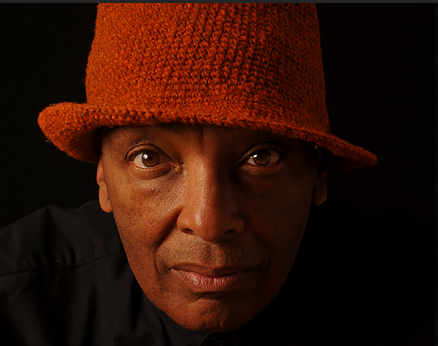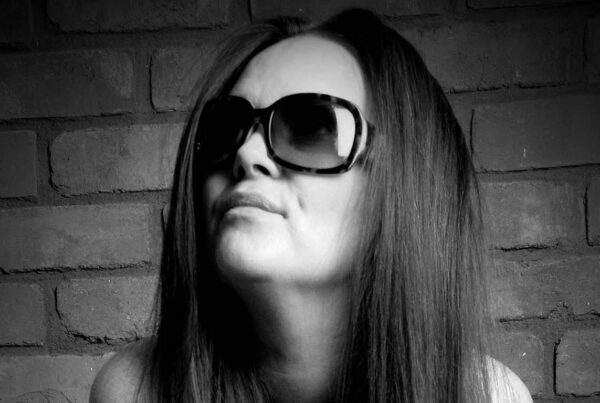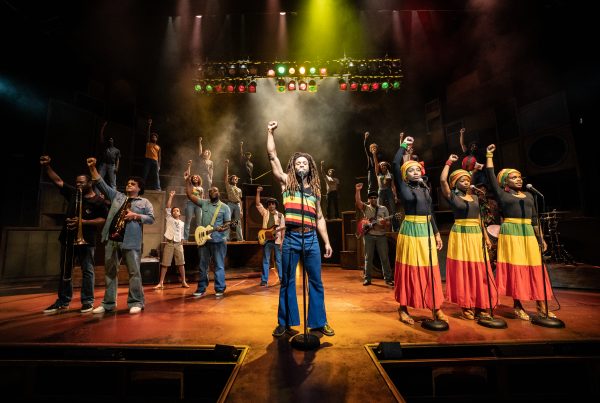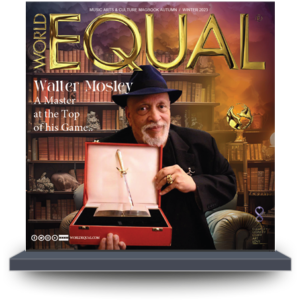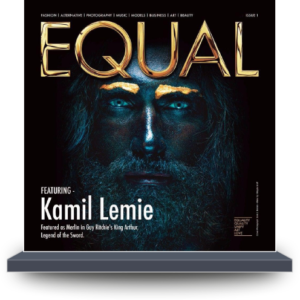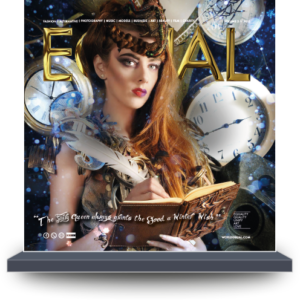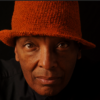Last Updated on 14/05/2024 by Equal
Writer/Filmmaker/Director/Producer
“Multi-Dimensional Creative Dynamo”
Over the past forty years Teddy Hayes has worked in entertainment and media covering a variety of roles with a variety of famous people and on a variety of different projects. Moving from New York City to to London 27 years ago, he has created a successful artistic life for himself that has resulted in his acknowledgement as a world-wide talent and “Multi-Dimensional Creative Dynamo”
Shelley Rodgers : How did you get into the arts?
Teddy Hayes: When I was about 4 or 5, I fell in love with music. It was 1956 and I remember having gone to the movie theatre at the top pf our street which was popular in those days. Every neighborhood had their own movie theatre and there was a film with Little Richard called Don’t Knock The Rock. My cousin took me to see it and after seeing that film I was hooked. I knew that I had to be involved with music and entertainment on a serious level. And also, there was always music in the house because my aunt who lived upstairs bought all of the latest records every week. And I would sit on the stairs and listen to what she played. Because she played all sorts of music, I was introduced to R&B as well jazz and gospel at an early age and because I could sing, I decided that I wanted to be a singer. In fact, I thought that was what I would be. And my grandmother gave me some voice lessons as a birthday present when I was 16, and I studied voice with a classical teacher for a while to learn to sing properly, but then fate intervened and I went to university and became a journalist instead.
Shelley Rodgers : So, then you got into writing?
Teddy Hayes: Yes, University was a really good experience because all of my family worked in factories and I knew that was something that I didn’t want to do, and having worked in temporary jobs in the post office and restaurants, I knew that I wanted a job that would allow me to see things and walk outside during the day. I went to Cleveland State University on a partial academic scholarship and I started working on the student newspaper and discovered that as a journalist I could go to nice restaurants for lunch at the newspaper’s expense and talk to people, some of whom were famous and travel around. And then the best part was that as a journalist I didn’t have to be inside an office all day, so what was there not to like? Being the editor of the student newspaper led to my first professional job as a news reporter at the Cleveland Call and Post newspaper owned and edited by the legendary W.O. Walker who was the publisher. That’s when I really started to get a sense of professionalism because Mr. Walker was a great role model and teacher and he instilled the importance of doing the work well in addition to having a sense of accomplishment. He also exposed me to the politics behind the newspaper business which was fascinating and invaluable. I remember one day I went into work and Mr. Walker told me to go to cover a hospital fundraising event where Muhammed Ali was doing a boxing exhibition. Can you imagine? Muhammed Ali, the heavyweight champion of the world. That was like going to see God.
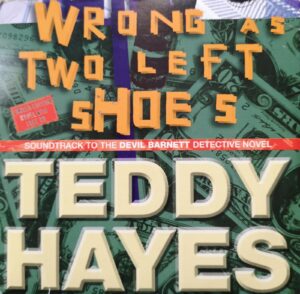
Shelley Rodgers : And so, you decided to continue as a writer?
Teddy Hayes: Those experiences at the newspaper played a big part in that. But the other thing was I changed my major from Journalism to mass communications because the university I attended had a brand-new TV studio and I really wanted to learn to make films. So, in my last year, I managed to get a job working in the professional TV station as a film processor and editor, so when I graduated, I’d already had 2 years professional experience in media.
Shelley Rodgers :That was unusual that you were so serious at such an early age.
Teddy Hayes: Probably, but I knew that if I wasn’t serious, I would end of doing something I really didn’t like. Since I knew I had to make a living doing something, I decided that I would be better off doing something I really liked, so I took a serious approach to my work and studies. I think subconsciously I was listening to my mother’s words. One day I remember she asked me what I wanted to be. I must have been eight or nine years old and I said a singer and then she asked what kind of singer.
I said I didn’t know. Then I said or maybe if not a singer a musician. And she said something I never forget. She told me that no matter what I decided to be, just be a good one, so somebody would be willing to pay me for doing it.
Shelley Rodgers : nd so, you gave up music when you went to university?
Teddy Hayes: Yes and no. Because even though I was heavily involved with media in the university, I still had to pay for a part of my tuition so I was always looking for ways to earn money, so I joined a band that played cover tunes. As a member of the band we played different small clubs on the weekends. I played bass and sang in the band. I wasn’t a good bass player by any means, but I was able to get through the songs we played which were mostly blues tunes and simple pop tunes. But that experience helped me to understand musical composition even though at the time I didn’t realize how much it would have a positive effect when I became more involved in producing music and theatre years later. At the time, music was something I could do and earn money and supplement my income while I was in university.
Shelley Rodgers : How did you wind up in New York in the 1970’s?
Teddy Hayes: After university, I got a job in the media department of a community action agency in Dayton Ohio, and the organization was offered a grant to make a documentary film. I got the job because having worked in the TV station in Cleveland I knew how to make films, so that experience led to me meeting and working with Quincy Jones and moving from Ohio to Los Angeles. That then led to me meeting writer/producer Melvin Van Peebles who arranged for me to move from L.A. to New York and work directly with his friend Roberta Flack as a road manager for a year and then to become his assistant in his production office.
Shelley Rodgers : That must have been really exciting.
Teddy Hayes: Yes, tremendously so, but difficult also because Melvin could be very difficult to work for. In the beginning I felt like walking away many times because he was so demanding. Sometimes, we worked 12 hours a day for 7 days a week, depending on the project. When I came to work for him, he was writing a lot of TV network specials and theatre projects, so there was a huge volume of work and as his assistant I was expected to be on top of everything and learn everything because there was only him and myself in the creative department of his company. But I managed to hang in, and after about 4 months I was making real progress. After a year I was promoted and then after working together two more years, I decided other opportunities started to show up and he asked me to stay on for another 6 months which I did. The great thing was we became good friends and continued to do projects together and stayed friends for 40 years until he died a few years ago. Melvin was a genius and my mentor and he taught me a lot about theatre as well as film.
Shelley Rodgers You worked on a program that won an Emmy, right?
Teddy Hayes: Yes, that was back in 1978, with Melvin on a project called The Day They Came To Arrest The Book, which was a TV film.
Shelley Rodgers :What was the hardest part of being a media person or artist in those days?
Teddy Hayes: Looking back, I think the hardest part was staying focused and not getting disappointed with all the ups and downs and keeping enough work coming in as a freelancer to pay the bills. Everything seemed to always be happening all at once. Almost every day or night I was going to the theatre or a screening or a musical event or was in the studio producing with a band I had formed or chasing down work as a freelance writer or record producer. Funnily enough, one of those musical acts that I wrote and produced for was a kid named Alfonso Ribiero on Prism Records who became the character “Carlton” on the Fresh Prince of Bel Air. I wrote and produced a song called r.
Dance Baby which he performed in 1984. It did Ok in the dance clubs and even made the Billboard chart, but never did anything major in the way of sales. Then in the late eighties music videos came into vogue. MTV had come onto the scene and all music groups had to have a music video if they wanted to compete, so I started producing and directing music videos with my friend Lamont “Liquid” Burrell who was working as a cameraman and editor. And that gave me the opportunity to really get my teeth into filmmaking because sometimes we would produce two or three videos per month. And the money was good so I could really concentrate on developing my craft as a director/producer.
Shelley Rodgers : Lamont Burrell, isn’t he the same person who you just worked with on the recent film you made?
Teddy Hayes: Yes, exactly, we have been working together since 1989. These days he is a Director of Photography for lots of big streaming productions like Netflix and Amazon but he was kind and generous enough to join me in Cleveland Ohio where I went to make a documentary film in January. The funny thing is we have worked so much and so long together, we were having some of the same conversations we’d always had all those years ago. And we had planned a three days shoot, but because we have such good chemistry, we finished in two days. So, we both were very pleased.
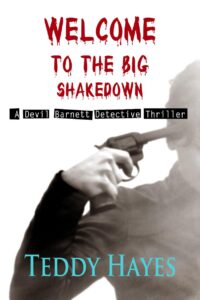
Shelley Rodgers : What made you decide to leave the US and live in London?
Teddy Hayes: By the early nineties, I had worked for so many companies and people in New York I was fed up with working for other people and making success for their projects and walking away with just a payment rather than a piece of the profits. I decided that I needed to work on projects that I owned. This was a slow burning feeling and that is why in the late eighties I decided that I wanted to create a character that had a long life and that I owned, and that’s when I created the character of Devil Barnett, an ex-CIA hitman who becomes a detective in Harlem, New York.
Shelley Rodgers : Having created Devil Barnett what was the response when you took your book to publishers in New York?
Teddy Hayes: Everyone rejected it. The publishers said that black detective fiction would not sell because their marketing experts said that the main audience for detective fiction were men between the ages of 20 and 30 and since I had a black detective, my core audience would be black men and black guys didn’t read! And then I told them that writers like Walter Mosley, Chester Himes and Donald Goins all had black detectives and they were selling but they still rejected me. Also, at the time I was hungry to make a feature film, but wasn’t getting any good responses. And even though by this time I was making some progress by getting my plays produced on stage in other American cities, I was still burning to make a feature film, so I decided that I would leave the US.
Shelley Rodgers : How did you get established in London?
Teddy Hayes: Things were a bit slow for the first couple months because I didn’t know anyone in London, but then when things started moving, they really took off. At first, I just started singing in pubs. Because I could always sing and having produced music in New York I knew how to work with bands, so I started singing Motown songs in London pubs. After a month or so I met some guys who owned a small production company who wanted to make music videos. I told them I could do it, presented them with my video show reel and got the job. Then I started freelance making music videos for this company on a project-by-project basis which led to me meeting my friend Alan Cutler who connected me with the theatre people who produced my first play at the Theatre Royal Stratford East in 1998. Then someone else introduced me to the Xpress publishing company who liked my Devil Barnett books and gave me a book deal.
Shelley Rodgers : How were your books received?
Teddy Hayes: The first book got me lots of publicity. In fact, it was because of the first book I attended the London literary festival and met Walter Mosley in 1998. The second book was also well received but it was the third book, Wrong As Two Left Shoes, that turned the tide. For this book I made a music CD because the character in the book was a song writer, and I decided to allow the reader to go inside the songwriter’s mind and experience what he was hearing and feeling as he wrote the songs. This was an idea that my publishing company balked at because it would cost more, so I agreed to pay for the CD myself and Xpress published the book and packaged it with the CD. This was something no one had done before as far as I know, . especially with a detective book. Anyway, as a result, I got a glowing review in The Guardian that attracted an American company who offered me a book deal in America. This was great because that deal put my books into circulation in a different way. As a result, my books went into American libraries so lots more people became aware of the books. This was important because this was before the explosion of Amazon and eBooks
Shelley Rodgers : How many Devil Barnett books have you written so far?
Teddy Hayes: So far, I have written 10 Devil Barnett books with number 11 on the way, hopefully by sometime late next year. And all of them are available on Amazon.
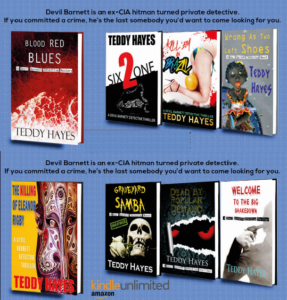
Shelley Rodgers : What’s the next step for Devil Barnett?
Teddy Hayes: I am looking to get a production deal with a streaming company. And it’s funny because after the third book a known Hollywood director approached my agent and made an offer to make a Devil Barnett film but I turned it down because I didn’t like the deal. I also didn’t like the work of the director who had previously worked on a great book with great characters that he in my opinion had screwed up, so I declined and am glad I did because now I have 10 books and streaming is alive and well. Also, I have started to attract top people like Emmy Award winning film editor Oral “Norrie” Ottey who has agreed to work on a Devil Barnett streaming project with me. So now I am just looking and waiting to see who will step up and make it happen.
Shelley Rodgers : Have you got more into producing musical theatre in the U.K than when you were in New York?
Teddy Hayes: Yes, in London I really got heavily into producing musical theatre. My latest one is a country musical that is ready to go as soon as I get around to getting some financial backers. Shelley Rodgers : Did you always like musicals?
Teddy Hayes: Not so much. In fact, it’s funny because as a kid I didn’t like musicals at all, because I only saw them on TV, and these were musicals with people like Doris Day. Musicals where suddenly the entire cast would break into song and dance together. And in my mind, it was ridiculous because my thinking was how could these people know the same dance steps when according to the story-line they didn’t even know each other. They just came together as a result of being in the same shopping area or walking along the same street. But all that changed when I saw West Side Story and My Fair Lady. These two filmed musicals made me look at musicals in a different way because the stories resonated with me. Also, when I went to work in New York, Melvin Van Peebles owned a company that papered the houses of Broadway theatres, so almost every day I came to work I was offered free tickets to Broadway shows; and I went to these shows at least a couple of times a week which is how and when I really started to understand how to write for theatre. Then later on I was involved with three of Melvin’s theatre productions, one of which was Waltz Of The Stork which went to Broadway in 1982, and I really began to understand the business side of theatre production which led to the writing of The Holding Pen which is a musical about 5 women in prison that was staged in Cleveland Ohio in 1987.
Shelley Rodgers : How many musicals have you produced?
Teddy Hayes: To date I have produced 5 musicals Off West End including one called Obama On My Mind and a musical adaptation of the Sherlock Holmes story Hound of the Baskervilles called The Baskerville Beast which we staged one year at the Hay on Wye book festival.
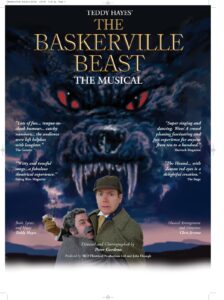
Shelley Rodgers : And you make films also?
Teddy Hayes: Yes, in fact I am finishing a documentary film now called Keeping the Dream Alive: A Lifetime’s Journey about an artist named Dale Goode from Ohio. I made my first feature film in 1999 called Her Name Was Amy Tillman and then it kept on from there. Since then, I have made two more feature films and other shorts films as well. But there is no pattern for me. If a film project comes up and if I like the project, I do it, otherwise I do something else like theatre or write books.
Shelley Rodgers : How do you do so many different things?
Teddy Hayes: I do many different aspects of the entertainment or media business but I don’t see them as different or even separate. To me the different entertainment mediums are like different rooms in the same house because in most forms of entertainment things overlaps each other; things such as story, actors, lighting, music etc. Throughout my career I have been very aware that whatever I’ve learned at one point was or could be an extension of something else I’d learned before.
For example, when I began to write novels I understood how to delve into the character’s mind or tell their backstory as a result of adapting a novel into a screenplay which is what I had to do when working with Melvin. In fact, one of the first successful things we worked on was a story called The Junior Bachelor Society which was a TV movie that we had to adapt from the book. Also, my first agent gave me a book and asked me to write a screenplay, so in both cases I knew that the assignment was about storytelling, but I also knew that I needed to tell the story in a way based on the constraints of the medium. I knew that when adapting the novel to a screenplay I could not write about what the main character might have been thinking that took up 10 pages in the book, because film is a visual medium and the story needs to be told in pictures as much as possible. Also, if you are telling a story with film, you can work with various elements to help tell the story including lighting, movement of the camera, the combination of different focal lengths in camera shots as well as effects to help tell a story that has more impact than if you put them into a novel. Also, in novels you can set the scene and then go into the look of the environment and how the character feels about it and how it affects them, but when making a film you have to ask yourself, what part of that of that background information and emotion do you want to put onto the screen visually?
Shelley Rodgers : is it the same for theatre?
Teddy Hayes: In theatre where the action is there all at once in front of you, the storytelling has to be different. It has to address the immediacy of the situation and the audience expectations. Onstage, you don’t have the luxury of the languid flashback to the beautiful environment that you may even transplant from the novel into the film, because people could get more easily confused or impatient. I’m not saying you can’t do it, but it’s tricky and if you get it wrong or do it badly you risk losing your audience which is sitting in their seats totally focused on your work; and is not being distracted by the phone or the dog, but just sitting there waiting for the emotional and mental stimulation that they are expecting from your work. Therefore, I try to look at the storytelling elements of a work and determine how I can best tell it so that it will connect emotionally with the medium and the audience.

Shelley Rodgers : You wrote a book about producing theatre am I correct?
Teddy Hayes: Yes, it is called The Guerrilla Guide to Being a Theatrical Producer. It’s for people who don’t have experience producing plays and explains how to do it, from the very beginning with very little money. I wrote it because there are so many people who talk about wanting to produce theatre, even on a local level, but don’t know the various elements or where to start, so I thought I would write a book explaining those things. Things that I have learned over the years through trial and error.
Shelley Rodgers : And how do you approach composing musical theatre, because you are also a writer of both words and music?
Teddy Hayes: For music, the approach may vary depending on why the music is there. For example, in a film, the music may serve as an overall feeling for the action, or some event about to take place that you want to the audience to react to in a certain way so that the music becomes part of the storytelling. Film composers call this musical manipulation of the audience, the “emotion lotion.” In musical theatre, the music with its lyrics usually has to perform a function like showing something about a character or telling about an event or situation or maybe capturing an emotional moment. So, my musical approach in theatre is to think about and speak to the function of what the music is meant to be doing in the most emotional way possible. I want to make the audience feel something as soon as they can, be that in the melody, the words or the arrangement. I always think that even if the music is subtle it has to touch the emotional core of the listener in some way. I learned this from listening to music on the radio growing up. I remember the film score from the 1970’s film Shaft. Its opening with its Wah-Wah guitar and high-hat cymbal sets the scene with anticipation and excitement for what is to come. Or, the now classic bass line in Michael Jackson’s song “Billie Jean.” Once the listener hears that throbbing bass line it makes them want to move along with it and follow where the music is going. And generally, I think any kind of musical storytelling needs to be like that. Something that makes the audience want to follow the artist, be it writer, director, actor or character, emotionally to where they want them to go. I don’t want to sound simplistic or regimented about the creative process, because it is not, but for me there are certain emotional connections from one thing to another that I try to keep in mind as I go from one form of presentation to another. That helps me travel freely from one form of artistic expression to the other like an “everywhere travel card” that allows me to ride buses, trains, airplanes or cars or even the wind if I choose to.
Shelley Rodgers : What would you say is the hardest part of being a writer/producer?
Teddy Hayes: I think the hardest part is getting financial backers or companies emotionally involved enough in your ideas to give you money to make them happen, because it can take years to get a project going. But if you persevere you can make it happen. I think I am proof of that. I also think perseverance is something that has to be developed and honed over time and has to become a part of the artist’s state of mind. I say this because so many people will tell you there is no market for what you want to do, but in reality, nobody knows what the public will like or where the market will be. Therefore, you have to really believe in what you do and continue to do it no matter what. I mean If someone had said 15 years ago “hey I got this musical with hip hop music about this obscure American founding father called Alexander Hamilton, that can be a hit all over the world most people would have turned their backs. But because the writer had had some success with another musical In The Heights someone was willing to give him a shot. But he had to get the success first before he was able to get the backers for Hamilton. And it’s the same for any writer/producer. They have an idea; they develop it and they put it out into the world and see what happens. I think many talented people can’t deal with rejection and stop trying. But I think that is a mistake.
Even the most successful producers and writers face the same thing. I was recently at the opening night of a new musical in London that was directed by one of the most commercially famous theatre directors in the world. And it was clear that by the middle of the first act that the show was at best under-whelming. This same director in the audience on opening night with his entourage, and I was thinking that this show was not going to be successful even though it had all the elements of what should have been a success. It had a famous literary character and good scenery, and money behind it but still that wasn’t enough, the book and the music and the direction were not engaging. In addition, the acting of the lead character in particular was inadequate. And later, the critics agreed with my observations and the musical bombed. It didn’t even make it out of previews. But that’s just the way it goes sometimes. In this business you just have to learn to take your failures and move on without letting it destroy your self-esteem and belief in yourself. I had my Devil Barnett book rejected by every company for 9 years before I got my first publishing deal. But I just kept moving forward, not listening to negative comments and keeping positively focused on my goal. I am a firm believer in the famous Japanese saying “Fall 7 times, get up 8.”
Many media companies are conservative and will only go with something if the numbers are in the artist’s or project’s favor, like if the writer has had a hot book, or if there is a hot actor or writer attached to the project. Their thinking is… if someone or something is a success or has enough successful elements they will give it a shot. Then there are other companies will take a chance because they like an idea that brings something new or different. But the truth is, there is no one way of doing things and most importantly there is no formula, which is why people with an idea should believe and keep pushing forward with their ideas no matter what, because no one knows what is going to be successful. And even though many online marketers like to sell people on the idea that there is a formula for making a successful product, there is no formula. There is luck, yes, which can make all the difference, and I have been lucky on a number of occasions, but people who sell the idea of there being a formula for success are not telling the truth, but rather saying what they think people want to hear to entice them to buy what they are trying to sell rather than having any validity.
Shelley Rodgers : What’s your next project?
Teddy Hayes: At the moment I am pretty focused on an art project that will expose new visual artists. At the moment I am pretty focused on an art project that will expose new visual artists. And also,
my main project which is of course getting Devil Barnett produced on a streaming channel which I am hoping to make happen sooner rather than later.
Shelley Rodgers : Thank you for talking with us.
Teddy Hayes: Thank you, its has been great talking with you as always.

